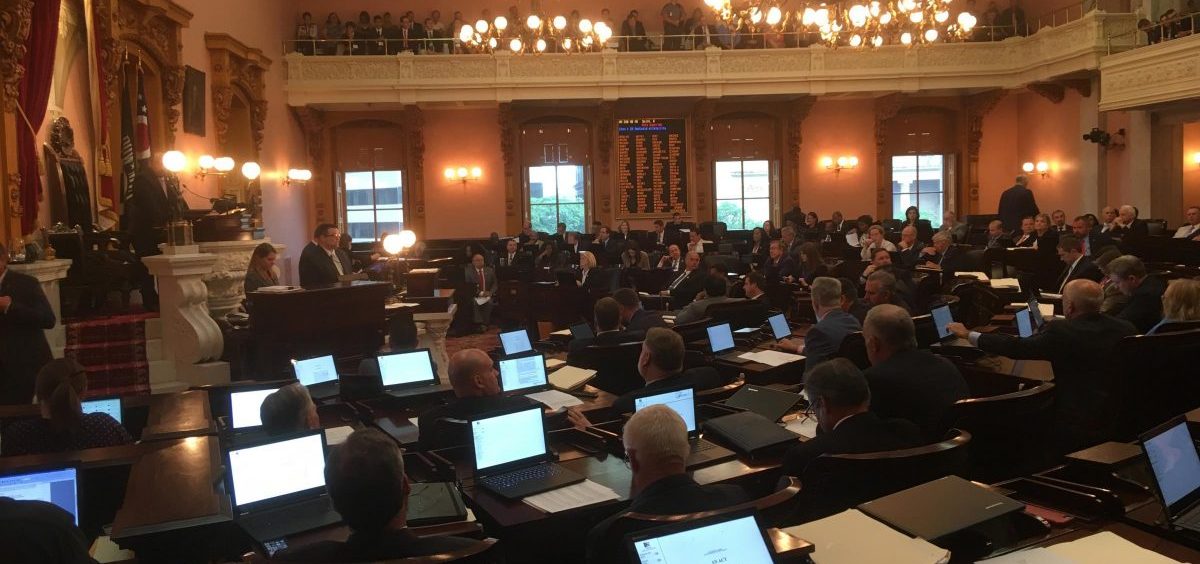News

Ohio lawmakers push to tighten bail requirements after court decision
By: Kaitlin Thorne | Ohio Valley ReSource
Posted on:
GALLIPOLIS, Ohio (OVR) – Mary Evans remembers the look on her mother’s face the moment that the judge set her bail at $500,000.
“My mom knew that it was over,” she said. “I could see every thought that my mom was having in her head when I turned around from the table. I’ll never forget, I could see my mom and she lost hope, she knew that she was going to have to move, she knew that all these things were happening, and I seen it and I was just like, ‘This is not going to be good.’”
Evans, originally from Gallipolis, Ohio, was arrested in 2010 for trafficking and possession of 54 grams of crack cocaine. It was her second offense, her first was a non-violent, non-drug-related crime. She remembers being shocked by the bail amount. She thought high bail was only for people accused of murder, not drug-related crimes.
Because of the drug trafficking charges, she was considered a flight risk and bail bond businesses wouldn’t work with her and her family did not have the financial resources to help her out, leaving her to sit in jail for 42 days. Her requests for alternative bond stipulations like an ankle monitor or home arrest were denied.
Where bail stands in Ohio
Currently, those arrested in Ohio may be released on bail before seeing a judge, depending on the type of charge a person is facing. They may have the option to pay based on the bail schedule, a predetermined amount recommended for different charges. But those who can’t post bail immediately have to wait in jail until they see the judge, who then sets bail based on the perceived risk of the individual, meaning if the judge feels the person is a risk to public safety or unlikely to return to court.
Advocates argue the bail system needs to be reformed because it disproportionately harms poor people who can’t afford to pay it. Supporters of bail reform in Ohio argue the system has left many sitting in county jails longer than necessary while they wait for their court dates, as they often can’t afford the pay bail. The system can also become a financial burden on the friends and family of defendants.
Patrick Higgins, policy counsel for the American Civil Liberties Union of Ohio, said communities around defendants often try and scrape together as much as they can to help with bail. Sometimes friends and family go to a bail bond lender, who will typically charge around 10 percent of the bail total as a fee. Higgins says that’s something wealthier defendants and their families don’t have to deal with.
“That’s what we describe as a two-tier system of justice, where, let’s say two people commit the same crime on the same day – have the same perceived risk level. The one with financial resources goes home, but the one who does not have that same access sits in jail with the potential to lose their job, custody of children, housing, all of the things that fall apart with just a few days in jail,” Higgins said.

Higgins said the bills uphold the constitutional idea of presumed innocence by ensuring that the vast majority of people are released from jail within 24 hours.
“What happens under House Bill 315 and Senate Bill 182 is a flipping of the script, or the question. Rather than that first question of ‘does this person go home or not’, the script flips to the presumption that a person goes home,” he said.
While the bills had bipartisan support, they’ve stalled in the legislature and have taken a backseat to the on-going redistricting battle in the Ohio House.
Bail reform has been widely discussed across the country for years, with Ohio’s neighboring states to the south and east both hearing legislation in the last few years. West Virginia passed a bail reform bill in 2020 and as of September 2021, the state has actually seen an increase in the jail population.
Meanwhile advocates in Kentucky have been pushing to eliminate cash bail in the state, but this year momentum was scuttled after a February 2022 shooting, in which a local activist allegedly shot at Louisville Mayoral Craig Greenberg. Following charges, Brown was released from jail in February with his $100,000 bail financed by the Louisville Bail Fund, a charitable bail organization. That prompted lawmakers to try and ban charitable bail organizations, but the effort failed.
The fall out from DuBose
Despite the legislative holdup, the Ohio Supreme Court issued a ruling earlier this year that will likely force lawmakers to reform the state’s bail system. In DuBose v. McGuffey, the court ruled 4-3 that public safety should not be a consideration when determining bail.
That means that the way many judges across Ohio have been using bail is unconstitutional, as they cannot set a higher bail based on a defendant’s threat to public safety.
The court’s decision stems from the case of Justin DuBose, who was charged with murder involving an armed robbery. His bail was set at $1.5 million. DuBose appealed for a reduction of bail based on the fact that it was higher than he could reasonably afford, effectively denying him the opportunity to bail out of jail and thus violating state and federal laws, including the Eighth Amendment of the U.S. Constitution.
DuBose was granted an appeal and his bail was reduced to $500,000, with conditions of release for tracking and supervision. The Ohio Supreme Court denied prosecutors’ pleadings to reverse the decision, citing an already established law that public safety could not be a consideration when establishing financial conditions of bail.
In response to the decision, Ohio Republican lawmakers launched an effort to try and tighten bail requirements. House Bill 607 would require judges to consider public safety as a factor when setting bail. The bill explicitly states that it is intended to supersede the DuBose decision.

The proposed amendment and bill are supported by Ohio’s Republican Attorney General Dave Yost, who said during a press conference that presumed innocence and public safety don’t necessarily go hand-in-hand.
“There’s a difference between a presumption of innocence in court and pretending that a career criminal is no threat on the street. This constitutional amendment is necessary to make our communities safe,” Yost said in a press conference.
But bail reform advocates say the measures would hurt poor people, saying inequality is inherent in the cash bail system.
During a meeting of the Ohio House Criminal Justice Committee, State Public Defender Tim Young pointed out that a large number of Americans live paycheck to paycheck with very little money in the bank. This renders many defendants unable to pay their bail, while wealthier Americans easily pay their way out.
“The history of cash bail is the history of two Americas divided by money,” Young said, arguing that ability to pay bail doesn’t necessarily equal safety.

Patrick Higgins, with the Ohio ACLU, says supporters of legislation to tighten bail requirements “want folks to be able to use excessive bail to keep people locked up pretrial.”
“There’s no data that backs up that cash bail would make us any safer than the alternatives,” Higgins said.
In order for the proposed constitutional amendment to appear on the November ballot in Ohio, House Joint Resolution 2would need to be approved by 60 members of the 99-member state House and 20 members of the 33-member Senate at least 90 days before the election. Whether or not this happens is yet to be seen and both the Ohio House and Senate are currently in recess. The resolution and all of the bills will be revisited when the legislature reconvenes in May.
The impact of bail on families
Not being able to pay for bail meant added pressures on both Mary Evans and her family. Evans had to figure out custody of her three children from jail. Her mother took over the responsibility of the children, which brought its own strain, because Evans was the main financial provider for the family. She said the situation caused her mother to move out of her home and into Section 8 housing with the three children, but that wasn’t even the worst side effect of the incarceration.
“Me going to jail actually increased my mother’s dependence on drugs too, my mom was an addict and that’s how she dealt with me not being there. So when I came home, my mom was an amputee, that’s where her addiction took her and I really feel a lot of it was she didn’t know how to handle the stress of trying to help raise my kids,” Evans said.
Evans said she was addicted to nerve pills when she was arrested. While in the county jail waiting for trial, she went through an un-monitored detox. She said she asked for help for the withdrawals and was denied.
After 42 days in jail, Evans took a plea deal for eight years in prison. During that time she got a degree from Sinclair Community College and was released a year early to work on a second degree through Antioch College, where she received a full-ride scholarship.
Today she works at Antioch College in the communications department. Though she is doing well, she says she still gets emotional thinking of that bail hearing and what her first thought was, “I’m never getting out.”
“Bail sets the tone for your journey and usually when you have a high bond and you can’t afford that, guess what that means – you can’t afford an attorney. So you’re going to get a court appointed one, who is probably going to provide the most bare-minimum defense that they can,” Evans said.
“Money is so influential in the judicial system, and I didn’t have it. So when he said half a million dollars, I turned around and looked at my mom and was like, ‘I’m not coming home.’ And I didn’t.”

